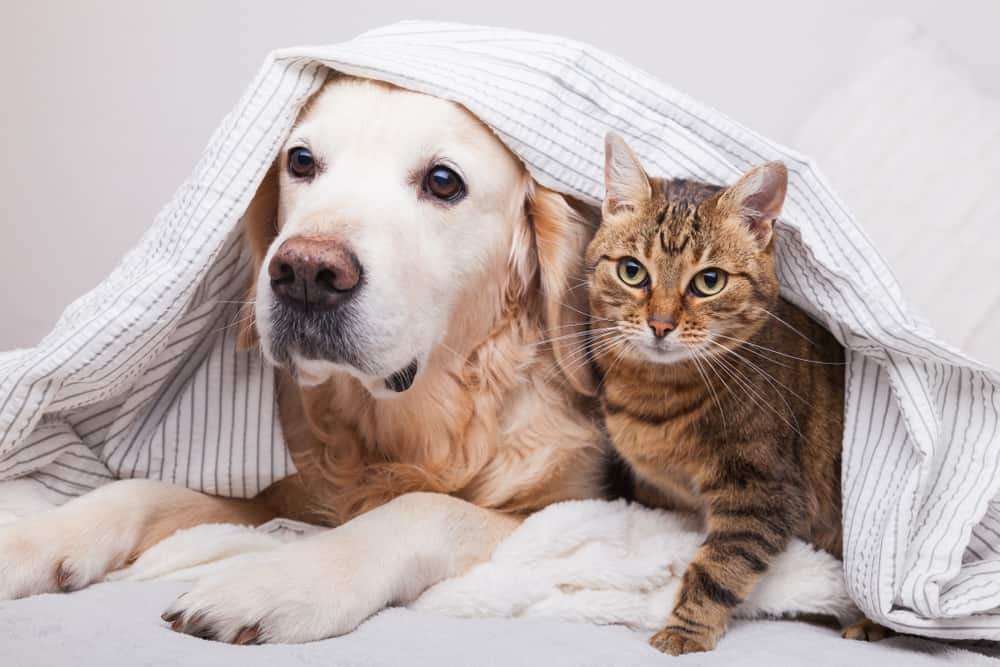Do you have both a cat and a dog as pets? If so, you may have always wondered Why Do Cats Hate Dogs? and vice-versa.
After all, they’re both animals that love attention and playing around. But why is that? what can you do about it? And what’s the root of their rivalry? Turns out, there are quite a few reasons – some scientific, others simply behavioral.
Table of Contents
Cat–dog Interactions Ratio With Humans
Cats and dogs have a range of interactions with humans, from companionship to working relationships. They are the most popular pets in the world, with dogs being the most popular and cats coming in second.
The majority of households in the United States have at least one pet, with dogs being the most common (38.4%), followed by cats (25.4%).
A 2021-2022 survey showed that there were 69 million households have at least one dog and 45.3 million kept cat as a pets in the United States.
Why Do Cats Hate Dogs? Here Are Some Reasons

Cats and dogs have been living side by side with humans for thousands of years, but their relationship is not always harmonious. Why Do Cats Hate Dogs? Let’s take a look at some of the reasons behind their rivalry.
1. Different Socialization Patterns
Dogs are social animals that have been bred to live in close proximity to humans, while cats are more independent. This difference in socialization leads to different behaviors and needs – dogs crave human interaction and love being part of a pack (even if that pack is just you and your family!), while cats are more content to be on their own.
2. Different Nutritional Needs
Cats are obligate carnivores, which means that they require animal protein to survive. Dogs, on the other hand, are omnivores and can get the nutrients they need from a variety of sources, including plant proteins.
3. Different Hunting Instincts
Cats are natural predators and have a strong hunting instinct. This instinct is often directed towards small animals like rodents or birds, but it can also be directed towards dogs.
4. Fear of the Unknown
Dogs and cats are both animals that are naturally curious. However, dogs are more likely to approach new people and things, while cats are more likely to be fearful of them.
This difference in behavior can lead to conflict – a curious dog may try to play with a cat, but the cat may interpret this as a threat and respond by attacking the dog.
5. Different Communication Styles
Dogs and cats use different methods of communication. Dogs communicate through body language, vocalizations, and scent, while cats communicate through body language and scent.
This difference can lead to misunderstanding – for example, a dog may bark at a cat in an attempt to play, but the cat may interpret this as a threat.
6. Limited Resources
Dogs and cats are both animals that require food, water, shelter, and attention from their owners. However, there are only so many resources to go around. This can lead to competition between the two species for these limited resources.
7. Sibling Rivalry
Dogs and cats are both animals that form close bonds with their owners. In many households, they are the only pets. This can lead to rivalry between the two species, as they compete for attention and love from their owner.
8. Territorial Behavior
Dogs and cats are both animals that have a strong sense of territory. This can lead to conflict between the two species, as they compete for space in the home.
9. Resentment of Each Other’s Presence
Dogs and cats are both animals that can become resentful of the other’s presence. This resentment can be caused by a variety of factors, including limited resources, competition for attention, and different communication styles.
10. Different Sleep Patterns
Dogs and cats are both animals that need to sleep, but they have different sleep patterns. Dogs typically sleep for 12-14 hours per day, while cats sleep for 16-18 hours per day. This difference can lead to conflict, as the dog may want to play when the cat is trying to sleep.
My Cat Hates My Dog: What Should I Do?

The rivalry between dogs and cats is rooted in their different needs and behaviors. However, there are ways to minimize conflict between the two species which are listed as follows:
1. Socialize Your Pets
One of the best ways to reduce conflict between dogs and cats is to socialize them from a young age. This means exposing them to each other in a positive way so that they can learn to coexist peacefully.
2. Feed Them Separately
Another way to reduce conflict between dogs and cats is to feed them separately and provide each pet with its own food and water bowl This will ensure that they are not competing for food, which can be a major source of tension between the two species.
3. Give Them Their Own Space
It is important to give dogs and cats their own space in the home. This means having separate beds, litter boxes, food bowls, and toys. This will help to reduce competition between the two species and make them feel more comfortable in their own space.
4. Avoid Punishing One Pet for the Other’s Actions
It is important to avoid punishing one pet for the other’s actions. This will only create resentment between the two animals and make the situation worse.
5. Be Consistent with Training and Discipline
It is important to be consistent with training and discipline when you have both dogs and cats in the home. This means using the same commands, rules, and punishment for both pets. This will help to reduce confusion and conflict between the two species.
6. Have Realistic Expectations
It is important to have realistic expectations when you have both dogs and cats in the home. This means understanding that they are different animals with different needs and behaviors. Accepting them for who they are will go a long way in reducing conflict between the two species.
7. Seek Professional Help
If you are having difficulty reducing conflict between dogs and cats in your home, it may be necessary to seek professional help. A certified animal behaviorist or veterinarian can offer guidance and support in teaching your pets to coexist peacefully.
What is the best dog breed to live with cats?

The answer may surprise you – it’s the Labrador Retriever!
Labradors are gentle giants who are known for being great with kids and other animals. They are also very obedient, so you won’t have to worry about them chasing after your cat. Plus, they are relatively quiet compared to other dog breeds.
If you’re looking for a dog who can peacefully coexist with your feline friend, a Labrador is the way to go!





